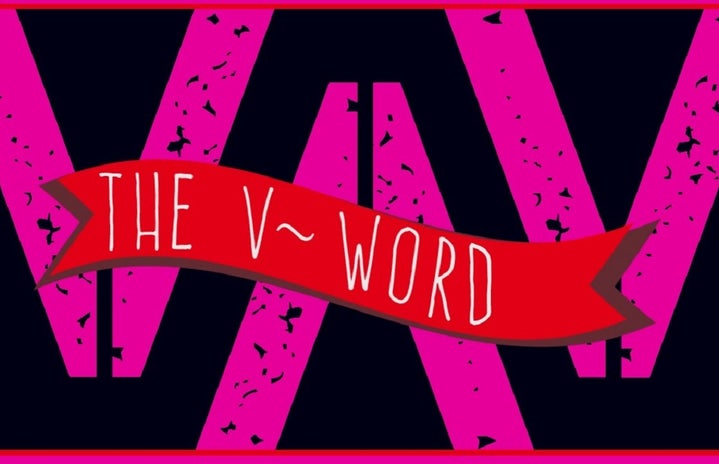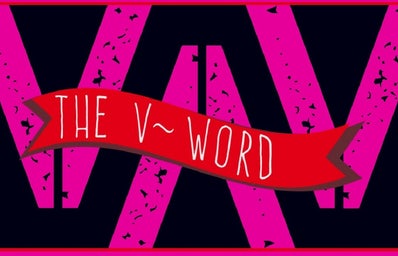This past Thursday, February 22nd, I saw Kutztown’s performance of Eve Ensler’s The Vagina Monologues. As a person with a vagina, I assumed I’d witness some new perspectives and feminist responses to how women/vaginas are treated, but I wasn’t ready for the litany of other ways people talk about vaginas as listed in the introduction: “Pussycat, Pooki, Twat, Powderbox, Poochi, Poopi, PeePee, Poonani, Pal, Piche, Toadie, Dee dee, Nishi, Dignity, monkey box, Coochi Snorcher, Cooter, Labbe, VA, Wee wee, horsepot, Nappy Dugout, Mondngo, Mooky, Pajama, Fannyboo, Mushmellow, Ghoulie, Possible, Tamale, Tottia, Connie, Mimi, Split Knish, Schmende”, and our Kutztown specific ‘vagooter and angry chicken’.
Growing up, I called it a vagina. Maybe it’s because my family is led by strong women. Maybe it’s because my mother worked in nursing homes, and hospitals, and after seeing so many: a vagina is a vagina. Like, how an over repeated word starts to feel like it’s not a word anymore, maybe she was desensitized to the stigma surrounding “vagina.” Because that’s what this is all about, all the bizarre and dehumanizing, objectifying ways we talk about genitalia. It’s anatomical, it’s scientific, yet we don’t teach our children to say those names, we teach about ‘private parts’ and ‘bathing suit areas’ and ‘no-no’ squares.
When I was a tween, my family invited a close friend out to dinner. He had been my twin brother’s best friend for years, and I don’t remember how it was said, but somehow in the conversation my mother said ‘penis’. Our friend blushed and started laughing because ‘we don’t say that at my house.’ And I remember my parents trying to decide how to handle this. Our friend’s parents were friends with our mom and no one wanted to overstep any boundaries. All she said was, “it’s not a bad word. But it’s not something you need to go around yelling.” I remember the car ride back home as our friend kept giggling and whispering ‘penis’ exactly like a little kid learning a new word.
It reminded me of 7th grade health class where every classroom was filled with uncomfortable teachers and hysterical students because they were talking about sex! They were using words like, penis, vagina, and breasts! When we use phrases like “no-no” square, and private parts, the language is teaching everyone to “stay away” as if the anatomy of our bodies are a mysterious thing to never understand or talk about. Typically, this language is used to help teach children when it’s inappropriate for an adult to touch them, and in that sense the language of “no-no” is useful in coding certain things as dangerous. But that kind of language continues, from my experience, well out of childhood and into adolescence and even young adulthood within most school systems.
Although what I just told you applies to both male and female genitalia, in high-school it’s a different story. The older teachers I had would refrain from indicating or referencing these things out of their tradition of polite conversation, which was favorable to the other group of teachers (mostly men) who would throw around penis/phallus/phallic/woody, and quietly mumble “female parts” or “lady parts” or the dreaded “lady biz.” I often think it’s an academic wonder I left high-school knowing anything about me, and my body. What I do know I 100% attribute to my mother and my doctor. I had one teacher senior year, an older woman, who felt comfortable with using the proper medical terms to discuss these things as they pertained to the material. She was the only one.
Even in college, during my required health course, people still giggled and laughed when our professor, a woman with an actual doctorate teaching at an institution that costs $27,000 a year, said the medically correct terms “penis” and “vagina”. This reaction is the same one little kids have to hearing a “bad word” for the first time and being told ‘oh I can say that but you can’t’ or ‘don’t let mommy know you heard me say that it’s a bad word.’
It’s sad when, as a country, we don’t educate or introduce women to their own bodies, on how to take care of them or what is or isn’t “normal.” Instead we tell them it’s a secret to keep away and hidden and safe for later. We tell them to spend money to make our vaginas smell like the laundry aisle in a grocery store, because it’s better to smell nice and ruin the PH balance of one of the most important body parts than offend someone. We tell them to clean it with other products that can irritate and throw our vaginas off balance and remind them constantly under any other circumstances to keep “hands off!”. When we tell them to ignore their vaginas, we’re telling them to ignore a societally and culturally important part of their identity for the sake of maintaining its objective form as a toy to be kept nice until it’s time to play with again.
There’s nothing inherently wrong, sinful, or dirty in the word “vagina.” It’s only a bad word because it’s been kept out of education and our language for so long that we don’t say the word, and we’ve started associating the taboo of saying “vagina” with vaginas. There’s nothing inherently wrong, sinful, or dirty about any part of my body. It is as it was created and intended to be, and that includes my vagina. In writing this, I said “vagina” 20 times. Which one made you uncomfortable? I hope none of them, but I doubt that’s true. Why? Because we call women by nicknames associated with food and animals in the same way we talk about vaginas based on their use, or objects. As people, we get uncomfortable because we don’t want to talk about that. About why we’re uncomfortable with the letters v-a-g-i-n-a arranged in that order.
And just like in one of the monologues, that makes my vagina angry.


